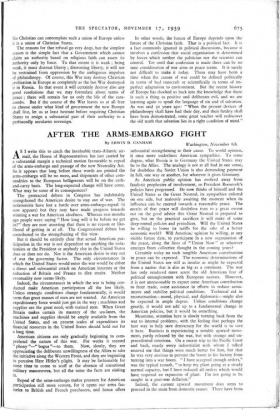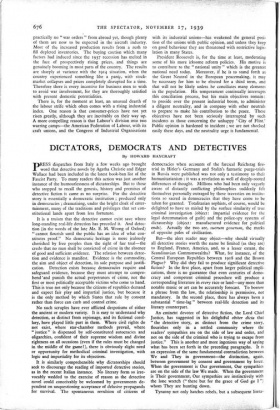AFTER THE ARMS-EMBARGO FIGHT
By ERWIN D. CAN HAM
Washington, November 6th.
AS I write this to catch the invaluable trans-Atlantic air- mail, the House of Representatives has just carried by a substantial margin a technical motion favourable to repeal of the arms-embargo and passage of the new Neutrality Act. So it appears that long before these words are printed the arms-embargo will be no more, and shipments of other com- modities to the European belligerents will be on the cash- and-carry basis. The long-expected change will have come. What may be some of its consequences?
The protracted debate in Congress has indubitably strengthened the American desire to stay out of war. The isolationists have lost a battle over arms-embargo-repeal (it now appears) but they may have made progress towards winning a war for American aloofness. Whereas two months ago people were saying " How long will it be before we get in?" they are now asserting that there is no reason or like- lihood of getting in at all. The Congressional debate has contributed to the strengthening of this view.
But it should be entirely clear that actual American par- ticipation in the war is not dependent on anything the isola- tionists or the President or anybody else in the United States does or does not do. Nor is the American desire to stay out of war the governing factor. The only circumstances in which the United States would enter the war would be either a direct and substantial attack on American interests or the reduction of Britain and France to dire straits. Neither eventuality now seems likely.
Indeed, the circumstances in which the war is being con- ducted make American participation all the less likely.
Unless strategic conditions change fundamentally, it would seem that great masses of men are not wanted. An American expeditionary force would just get in the way ; machines and supplies are the great need, with trained men. When Great Britain makes certain its mastery of the sea-lanes, the machines and supplies should be amply available from the United States, and on present scales of expenditure its financial resources in the United States should hold out for a long time.
American citizens are only gradually beginning to com- prehend the nature of this war. For weeks it seemed " phony "—" bogus "—to them. Now, slowly, they are appreciating the deliberate unwillingness of the Allies to take the initiative along the Western Front, and they are beginning to perceive Herr Hitler's plight. It may be fashionable for some time to come to scoff at the absence of sensational military manoeuvres, but all the same the facts are sinking in.
Repeal of the arms-embargo makes pressure for American participation still more remote, for it opens our arms fac- tories to British and French purchasers, and hence offers substantial strengthening to their cause. To world opinion, it once more underlines American sympathies. To some degree, what Russia is to Germany the United States may be to the Allies. The analogy is not at all had in one sense, for doubtless the Soviet Union is also demanding payment in full, one way or another, for whatever it gives Germany.
As American public opinion has evolved away from fatalistic prophecies of involvement, so President Roosevelt's policies have progressed: He now thinks of himself and the United States as the Great Neutral, its sympathies enlisted on one side, but zealously awaiting the moment when its influence can be exerted towards a reasonable peace. The merits of that peace will doubtless turn to a great extent not on the good advice this Great Neutral is prepared to give, but on the practical sacrifices it will make of some deep-rooted policies and prejudices. Will the United States be willing to lower its tariffs for the sake of a better economic world? Will Americas; opinion be willing, at any visible future date, to participate in a new organisation of the peace, along the lines of " Union Now " or whatever emerges from collective thought in the coming years?
Certainly today no such tangible American contributions to peace can be expected. The economic determinations of the United States are still as insular as might be expected from a nation that is also as big as a continent. The war has only rendered more acute the old American fear of political entanglements with European nations. However, it is not unreasonable to expect some American contribution to freer trade, some assistance in efforts to reduce arma- ments and stabilise political conditions. Technical aid in reconstruction—moral, physical, and diplomatic—might also be expected in ample degree. Unless conditions change greatly, it would not add up to a fundamental change in American policies, but it would be something.
Meantime, attention here is slowly turning back from the war to internal problems, with the feeling that perhaps the best way to help save democracy for the world is to save it here. Business is experiencing a notable upward move- ment, partly released by the war, but with strange and un- precedented emotions. On a recent trip to the Pacific Coast and back, nearly every industrialist with whom I talked assured me that things were much better for him, but that he was very anxious to prevent the boom in his factory from turning into a war boom. " I have accepted enough orders," was the typical remark, " to keep my plant going at a steady normal capacity, but I have reduced all orders which would have required an expansion of plant. I'm not going to be caught in a post-war deflation."
Indeed, the current upward movement does seem to proceed in the main from domestic causes. There have been practically no " war orders " from abroad yet, though plenty of them are now to be expected in the aircraft industry. Most of the increased production results from a rush to fill depleted inventories. The buying caution which many factors had induced since the 1937 recession has melted in the face of prospectively rising prices, and things are genuinely booming in most parts of the country. The results are sharply at variance with the 1914 situation, when the country experienced something like a panic, with stock- market collapses and prices completely disrupted for a time. Therefore there is every incentive for business men to wish to avoid war involvement, for they are thoroughly satisfied with present domestic potentialities.
There is, for the moment at least, an unusual dearth of the labour strife which often comes with a rising industrial index. One reason is that consumer-prices have not yet risen greatly, although they are inevitably on their way up. A more compelling reason is that Labour's division into two warring camps—the American Federation of Labour, with its craft unions, and the Congress of Industrial Organisations with its industrial unions—has weakened the general posi- tion of the unions with public opinion, and unless they keep on good behaviour they are threatened with restrictive legis- lation in many States.
President Roosevelt is, for the time at least, moderating some of his more irksome reform policies. His motive is to contribute to the " national unity " which is the greatest national need today. Moreover, if he is to stand forth as the Great Neutral in the European peacemaking, it may be necessary for him to be elected for a third term, and that will not be likely unless he conciliates many elements in the population. His temperament continually interrupts this conciliation process, but his main objectives remain: to preside over the present industrial boom, to administer a diligent neutrality, and in company with other neutrals to prepare to make his contribution to the peace. These objectives have not been seriously interrupted by such incidents as those concerning the unhappy ' City of Flint.' Public opinion is hardened to incident ; we are not shocked easily these days, and the neutrality urge is fundamental.





































































 Previous page
Previous page